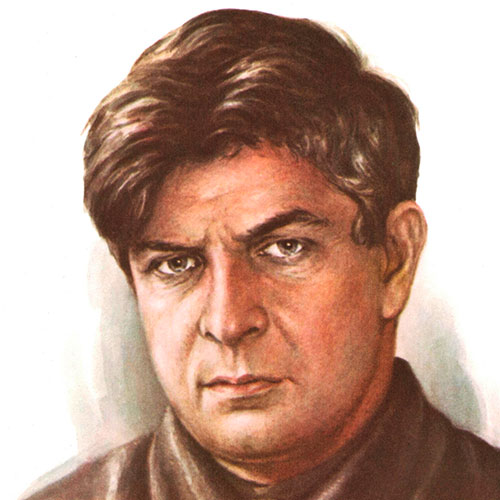
Eduard Bagritsky Poems
Bagritsky, whose real surname was Dzyubin, was born into the family of a poor Jewish shopkeeper. He completed training to become a land surveyor, but he began to write poetry and never worked at that profession. His first poetry was published in various literary almanacs of Odessa, under the influence partly of the Acmeists and partly of the Futurists. He participated variously in Red Army revolutionary battles in 1917-1918 and on the Persian front in 1919 as a propaganda writer. After the Civil War he returned to Odessa to work in the southern division of ROSTA, the Russian news agency, together with Yury Olesha, Vladimir Narbut, and Valentin Katayev. When he moved to Moscow in 1925 he joined the Constructivists but was never close to them in spirit.
He published his first collection of poems, Yugo-zapad (Southwest), only in 1928. Although seriously ill with asthma, he managed to publish two more collections before his early death. Isaac Babel was a close friend all his life and was with Bagritsky and his wife at the very end. Narbut, a relative of his wife, published an almanac, To the Memory of Bagritsky, in 1936. Bagritsky's wife, Narbut, and Babel were all arrested in 1937; only his wife survived, to be released after nineteen years in the Karaganda gulag.
Like his favorite hero, Till Eulenspiegel, Bagritsky was simultaneously a romantic and a man of the real world. The gait of his poetry was also like Eulenspiegel: light, dancing, clastic. Bagritsky accepted the Revolution unconditionally, fought in special detachments, and, accepting the age, wishing to be in harmony with it, tell into its errors. A brilliant master, gifted with a rare perceptive impressionability, Bagritsky sometimes went astray in his attempts to achieve a philosophical understanding of the world. His lines about our century in the poem "TVS" are ominous and repugnant in the face of so many lives tragically destroyed in the post-Revolution era: "But if he says: 'Lie!' — then lie. / But if he says: 'Kill' — then kill." But we cannot take these lines, written in 1929, apparently in a period of depression, as the philosophical credo for all of Bagritsky's poetry, as a few interpreters have attempted to do.
Bagritsky's best collection, Yugo-zapad, contains his finest poem, "Duma pro Opanasa" ("Meditation on Opanas"), written in verse forms inspired by Taras Shevchenko (1814-1861), the great Ukranian poet, using folk song metrics and at times Shevchenko's expressiveness as well. Bagritsky's talented, multicolored poetry provided, in its time, a master school for the young poets of the 1920s and 1930s, many of whom flew from his genial hand to reach their own heights. And in this Bagritsky was Till Eulenspiegel — not just by accident, judging from the stories that were told. He loved to set songbirds free from their cages.